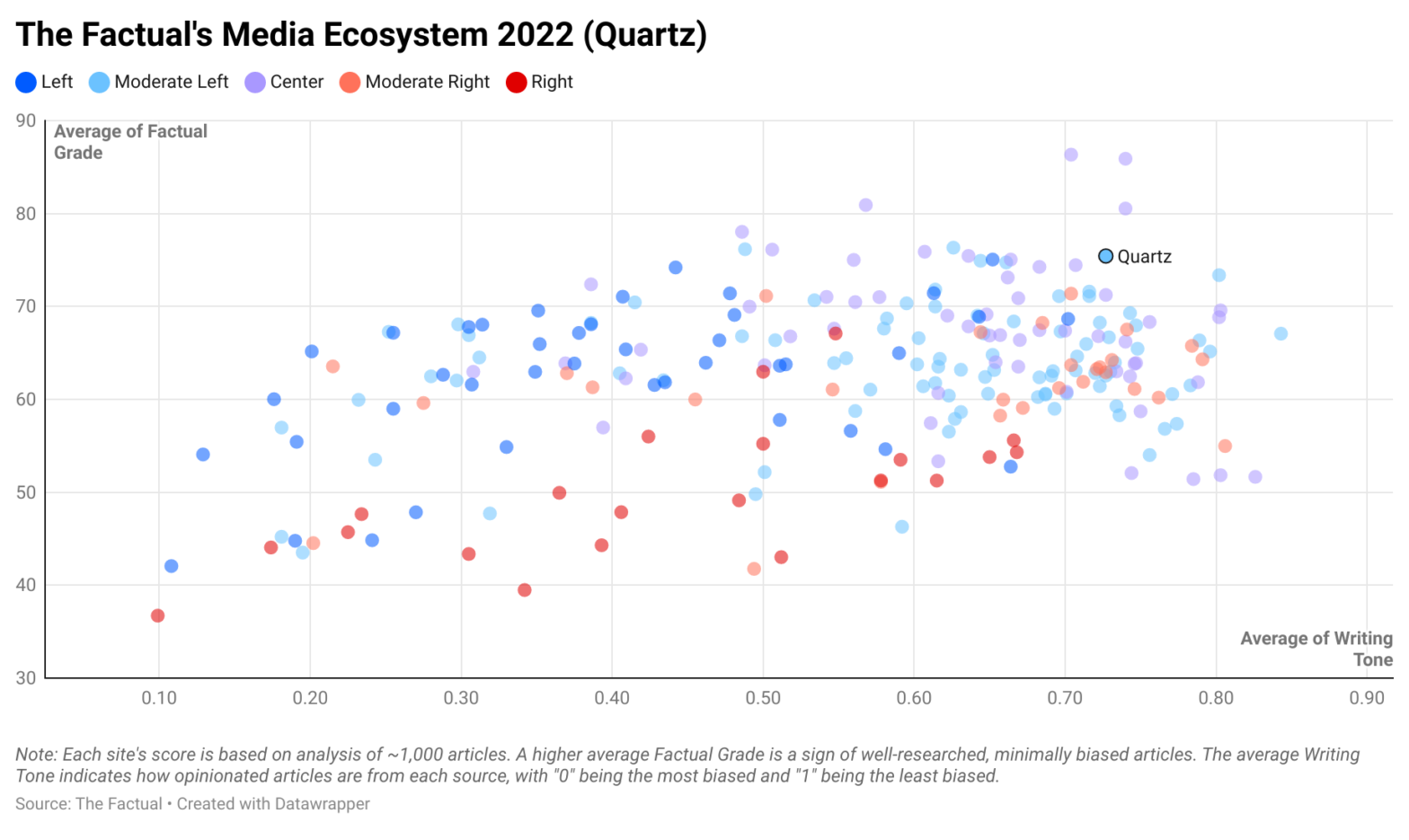Quartz is an international, English-language publication focused on business and the global economy. Its target audience includes members of the high-earning and entrepreneurial business classes, and it aims to be “the greatest ally and resource for purpose-driven professionals in search of these new approaches to business.” At its founding in 2012, it drew talent from big-name publications like the New York Times, Wall Street Journal, The Economist, and Bloomberg. So, how reliable is Quartz and how biased is its content?
How Does The Factual Rate News Sources?
The Factual analyzes more than 10,000 news stories every day to help readers find the most informative, least-biased articles. Our news-rating algorithm scores each article along four metrics: (1) cited sources and quotes, (2) publication history, (3) writing tone, and (4) author expertise. These scores combine in a weighted average we call a Factual Grade, which ranges from 0–100%. (See our How It Works page to learn more about our algorithm.)
For this study, we analyzed ~1,000 articles each from 240 news sources. The average Factual Grade for the entire dataset was 62.5%. Based on these averages, we can compare the performance of news sites across the media ecosystem. The entire dataset can be explored in greater detail here.
How Factual Is Quartz?
Quartz scored an average Factual Grade of 75.4%, placing it in the 95th percentile of our dataset. In fact, it received the eleventh-highest average for any site that we analyzed.
These high scores are determined by high performance along each of the metrics that The Factual analyzes. Articles consistently include extensive sourcing of information using high-quality external articles or direct quotes. Authors who write for Quartz exhibit an extensive topical expertise, meaning they bring a record of covering specific topic areas. Quartz additionally receives high scores for publication history because the site has a record of making high-scoring articles over the entirety of The Factual’s data. Lastly, articles are largely written in an unbiased manner.
Like any news source, scores for articles from Quartz vary widely based on these factors. For example, some scored above 90%, while others scored below 60%.
Please check your email for instructions to ensure that the newsletter arrives in your inbox tomorrow.
How Opinionated Is Quartz?
One of the metrics The Factual uses is the Writing Tone, which measures how opinionated the writing is in an article. For this metric, the algorithm looks for signs of subjective commentary (e.g., first person pronouns and unnecessary adverbs), as well as the emotional nature of selected words, and sees how prevalent they are for a given length of text. More neutral text receives higher ratings, with “0” being the most opinionated and “1” being the most neutral.
Quartz had an average Writing Tone score of 0.73, placing it in the 82nd percentile in our dataset for this metric. This score suggests that articles from Quartz tend to be written in a neutral tone and avoid use of highly opinionated language. This is evident in minimally biased headlines such as “How the US plans to track Covid-19 vaccine doses” and “Why economists are talking about stagflation.”
How Biased Is Quartz?
The Factual classifies news sites by political bias as either Left, Moderate Left, Center, Moderate Right, or Right. This classification comes from third-party assessments from media bias organizations such as AllSides and Media Bias/Fact Check (MBFC). Based on this data, The Factual assigns Quartz a Moderate Left bias.
MBFC classifies Quartz as “Left-Center” due to “story selection that slightly favors the left.” They ground this classification on the tendency for the site to publish (1) articles that are negative about the former Trump administration, (2) articles that are generally negative toward conservatives, and (3) articles that uphold the scientific consensus on topics like climate change. They also give Quartz credit for highly factual reporting and adequate sourcing of information.
AllSides rates Quartz as “Center” based on independent research and 1,707 community ratings. However, AllSides provides very little information to back up this classification and has yet to complete a full editorial review of Quartz. As a result, they give their classification a “low or initial” confidence rating.
Please check your email for instructions to ensure that the newsletter arrives in your inbox tomorrow.
Who Owns Quartz?
Quartz is owned by media holding company G/O Media, which counts The Onion, Jezebel, The Root, Kotaku, Gizmodo, and Deadspin among its other publications. G/O Media purchased Quartz in April 2022, but much of the company’s recent history has been marred by employee dissatisfaction and complaints about a lack of editorial protections. Mass resignations at multiple sites, including Jezebel and The Root, have drawn attention to G/O Media’s management. Quartz is funded through advertisements and subscriptions.
Why Does It Matter?
News articles always have some bias because all authors have some frame of reference within which they describe a story. Political bias ratings are helpful in understanding this framing. However, it can be more beneficial to know how factual an article is based on quantifiable metrics that can be seen across the media ecosystem, such as cited evidence, author expertise, and writing tone. This is what The Factual ascertains.
Reading several, highly rated articles from across the political spectrum helps counter the bias of any news source or story. To have the day’s most factual news stories delivered to your inbox every morning, subscribe to our daily newsletter.
Article published on September 21, 2022 to reflect new data.

